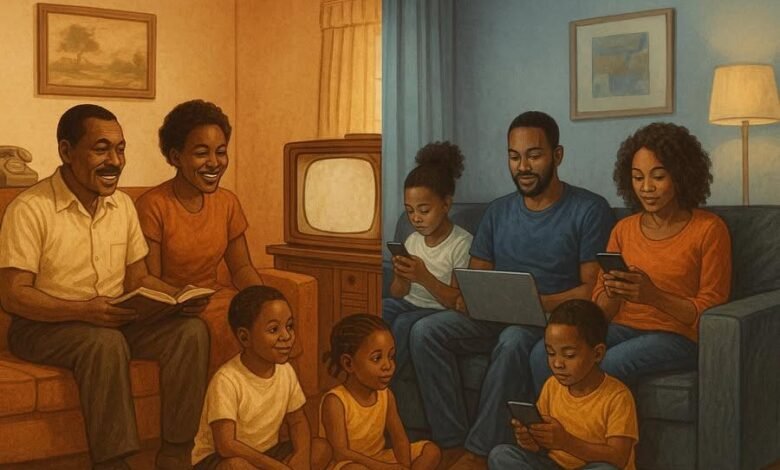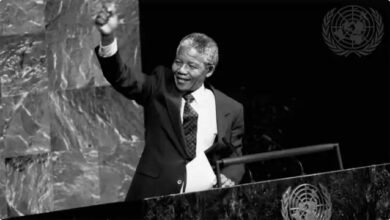The Real Problem Isn’t Social Media: It’s Our Precious Children’s Uncontrolled Access (Part 1)

Theme: Foresight, Failure, and the Silence of Adult Example
Intro:
This week’s #HomilyFromThePew is the beginning of a two-part reflection on one of the most urgent questions of our time, How do we raise children in a world where the screen never sleeps?
The essay opens a sober conversation about foresight, adult example, and the cost of our collective silence.
“Train up a child in the way he should go: and when he is old, he will not depart from it.” Proverbs 22 : 6 (KJV)
There is an onslaught going on, not against nations, but against innocence. Not through guns or bombs, but through gadgets and algorithms.
Every day, multiple platforms compete for the attention of our children, and many of us, parents, teachers, caregivers, and faith leaders, are losing the contest without realizing it.
Across the world, governments are reacting. In the United States, several Attorneys General have sued social-media giants, demanding accountability for the mental-health toll on children. The state of New York has taken platforms to court, seeking funding for the treatment of affected students. In Australia, new legislative efforts call for children to be barred from social-media use until they turn 16. Schools in different nations now ban phones outright. Advocates and experts everywhere are chanting the same refrain: “Keep them off, keep them out.”
But avoidance is not the same as safeguarding and protection. Outright bans are not control; they are surrender.
Holding companies accountable is necessary, but it cannot be our primary defense. It is a secondary responsibility. Our original contribution as parents, educators, and nations must be the creation of systems that teach children to live wisely in a digital world, not flee from it.
Age restrictions have a place; they are part of reasonable control. But control is not a one-size-fits-all formula. Every child matures differently. Every family has unique rhythms of supervision and trust. Responsible digital parenting demands discernment, not panic — thoughtful structure, not reactionary bans.
When we discuss “the dangers of social media,” we often make a critical mistake. We call the problem exposure. But exposure itself is not the enemy. The real danger lies in unbridled, uncontrolled, and unregulated exposure, children navigating a digital world without guidance, boundaries, or values.
Social media is not evil. It is a tool, powerful, persuasive, and permanent. Like every tool, it serves according to the hand that wields it.
I speak not as a distant observer or theorist. I have been on this field for nearly three decades, since 1997, before the dawn of Facebook or TikTok, working with children, training parents, guiding teachers, and strengthening families across Africa and beyond. As a Family Attorney, Family Strengthening and Child Safeguarding & Protection Innovator, and Parenting Ideologue, I have partnered with some of the most notable African and international child-focused organizations, promoting a values-based, human-angle, and systems-driven approach to policy and practice.
Today, as a father raising my three-year-old son in the digital age, I have watched technology reshape childhood in real time. I now see the battlefield from both sides, the home and the world.
Our challenge is not to escape this new world but to equip our children for it. We must raise them to be value-driven digital citizens, children who can think critically, feel deeply, and act wisely both online and offline.
The Failure of Foresight
What we are seeing today did not arrive suddenly. Facebook has existed for over two decades. YouTube, Instagram, TikTok, and Snapchat have shaped our culture for years. The crisis of self-harm, pornography, suicide, and online grooming among children was not unforeseeable. It was simply unaddressed. Either we did not see it coming, or we saw it and did nothing. Both are failures of foresight.
This reflection is written without prejudice to the anguish of parents who have lost children in this battle. My heart goes out to every mother and father who has buried a child whose life was shortened through suicide, sextortion, or the silent torment of social-media addiction.
This is not a mission to apportion blame or to speak over grief. It is an appeal for foresight, a call to forward-thinking. No one who has buried a child remains the same. In the private corners of their hearts, they replay the pain with questions that have no easy answers. And yet, if we must honor the memory of the children we have lost, we must channel sorrow into strategy. We must allow pain to become policy, heartbreak to become hindsight, and hindsight to become wisdom.
Some may argue, “We have never lived through a digital age before. How could we have seen it coming?”
That argument has emotional weight but not moral strength. Humanity has never faced any age before its time, not the Industrial Revolution, not the Atomic Age, yet we always had the duty to imagine.
To care for children is to anticipate. To safeguard them is to foresee both need and threat and to prepare for both before they arise.
That is the meaning of care. That is the essence of caution. We cannot use the novelty of the Fourth Industrial Revolution as an excuse for neglect. The fact that we have never been here before should have made us more alert, not more complacent.
Every major innovation demands a moral response. Airplanes brought aviation laws. Automobiles birthed traffic regulations. The digital revolution demands digital parenting and ethical imagination.
We waited until tragedy forced our attention, until parents began to bury children who learned death through devices. We waited until lawsuits piled up, until governments started suing social-media companies, until the pain of broken families spoke louder than our collective silence.
And now, in panic, we are reacting. We are banning phones, deleting apps, and creating blanket restrictions. But reaction is not safeguarding and protection. When we react, we cannot be resourceful.
True solutions are born from reflection, not hysteria. We missed it not because the danger was invisible, but because imagination was idle.
The Silence of Adult Example
And I am not surprised by this disposition. If we take honest inventory, we will find that matters concerning children are often treated this way, as afterthoughts, as sidebars to adult priorities.
We do not ban cars, though accidents happen daily. We do not outlaw guns entirely, though they kill thousands. But when it comes to children, prohibition becomes the easiest response.
Why? Because children have no protest power. They cannot march. They cannot legislate.
Even when they have a voice, they lack the authority for enforcement. So adults — parents, teachers, governments, decide for them, often impulsively, often reactively, rarely consultatively.
When was the last time any government held a children’s referendum before deciding on policies that affect them? Before banning phones in schools, how many carried children along in dialogue?
We forget that participation is protection. Iceland remains a rare example: when youth behavior became alarming, they did not react with bans. They rebuilt value systems, empowered parents, and rewarded family time. That became the Icelandic Model, a humane, preventive response rooted in dignity, not fear.
But in too many nations, we prefer shortcuts to systems. We legislate emotion instead of insight.
And so, history repeats itself, every time at the expense of the smallest among us.
Yet, there is another uncomfortable truth: children are not the only ones online. They are only mirroring what they see. Their digital behavior is a reflection of ours, parents, teachers, leaders, and mentors. Children are either the beneficiaries or casualties of adult examples.
We cannot demand restraint from those we model recklessness to.
If a child grows up in a home where both parents are glued to their phones, where conversation has been replaced by scrolling, what will that child learn except imitation?
Years ago, research on television confirmed that children watch what their parents watch. The same holds true for social media, children do what their parents do. In too many homes today, father, mother, and child sit together, each absorbed in separate screens, united only by disconnection.
We are not addressing how the uncontrolled and excessive use of digital platforms by adults has eroded family cohesion. That silence is tragic. We treat symptoms in children while ignoring the infections in ourselves.
If we truly want digital discipline among children, it must begin with digital discipleship among adults.
Closing:
As this first part closes, I invite us to pause and reflect: if we want digital discipline in children, it must begin with digital discipleship in adults.
Next week, in Part 2, we continue the conversation, exploring exposure, opportunity, and how values, not fear, can guide our children through the Fourth Industrial Revolution.
Do have an INSPIRED week ahead with the family.





